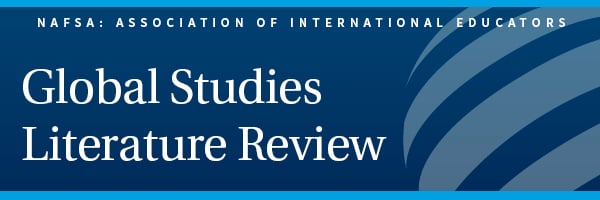
Framing the Global
This year, the Global Studies Literature Review (GSLR) offers a new issue (No. 7) focused on the theme, “Framing the Global.” Inspired by Hilary E. Kahn’s edited volume Framing the Global: Entry Points for Research (Indiana University Press, 2014), which offers a set of academic research perspectives on disentangling global phenomena from local and transnational lived worlds, the GSLR editors sought to extend this challenge of global analysis to scholar-practitioners within international education. As professionals in a field that assumes global mobilities, how do we articulate the meaning of “global” for our own professional work? And, how does this impact our shared knowledge of the world that our students and colleagues in higher education seek to understand?
Included in this issue are a set of featured essays with innovative and intellectually demanding considerations of the entry points to our work in international education. Kahn urged the scholars involved in the original Indiana University’s Center for the Study of Global Change project to challenge and disrupt their own disciplinary assumptions through experimentation with new methodologies grounded in ethnographic and empirical data of the lived world. This juncture served to open “entry points” to describe the partial, relational, symbolic, negotiated, and enacted characteristics of “globals” that shape specific research topics (Kahn 2014, pp. 6-7). The essays presented here extend this work in ways that disrupt our own assumptions about international education as a field, and offer new thinking about both methodology and grounded experience.
We hope the essays and synopses included in this issue deepen and expand our conversations in the field and lead us to even newer entry points and frameworks for appreciating the complexity of this world we share.
Download Issue No. 7
Features
From the Editors
"Editors' Notes" by Emily Gorlewski, Rebecca Hovey, and Bryan McAllister-Grande (Co-editors)
Featured Essays
"Framing International Education within the Global" by Eric Leise
"Ripples without Estimation" by Mohanalakshmi Rajakumar
"The Geoframe: Pedagogy for Education Abroad" by Nathan Frank
"Toward the Intellectual–Administrator? The Utility of Frames in the Craft of International Education" by Jonathan L. Larson
Reviews
Internationalization and Higher Education
"Internationalizing the Curriculum: Getting to the Core of Academic Learning" by Nick J. Gozik
- Review of: Internationalizing the Curriculum by Betty Leask
"The Power of the Disciplines and the Internationalization of Knowledge" by Bryan McAllister-Grande
- Review of: Internationalizing the Curriculum by Betty Leask
- Internationalizing Higher Education: Critical Collaborations Across the Curriculum edited by Rhiannon D. Williams and Amy Lee
Critiques and Reform of Higher Education
"Can Theology-Based Reflection Create a Conduit to Employment with Purpose?" by Marc Thomas
- Review of: The Purposeful Graduate: Why Colleges Must Talk to Students about Vocation by Timothy Clydesdale
Intercultural Communication and Language Education
"Placing Student Learning at the Center of Assessment" by Colleen Connor Barrie
- Review of: Demystifying Outcomes Assessment for International Educators: A Practical Approach by Darla K. Deardorff
"Student Mobility and Migration Goes “Glocal”" by Jason Sanderson
- Review of: Intercultural Contact, Language Learning and Migration edited by Barbara Geraghty and Jean E. Conacher
- Introducing Language and Intercultural Communication by Jane Jackson
Global Issues: Foreign Policy and Political Economy
"Finding Entry Points and Junctures of Knowledge in the Spanish Context" by Kate S. McCleary
- Review of: Patrones culturales y sociedad contemporánea: Apuntes para una ciudadanía global by María Luisa Sierra Huedo
Social Justice and Human Rights
"Marginalized Masses in the Post-Keynesian Era" by Joseph Stanley
- Review of: Expulsions: Brutality and Complexity in the Global Economy by Saskia Sassen

